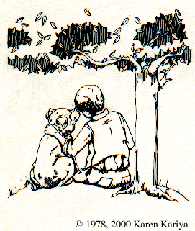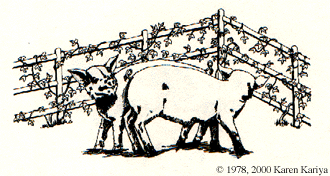of Honniker Winkley
|
Little known until several loosely bound volumes of his note, sketches and poems were discovered less than a kilometer from the farm which became his notorious Parc des Porcs during his declining years, Honniker Winkely might well have languished unread and forgotten. His work was scorned, when noticed at all, by the theory-oriented French Post-Symbolists of the early years of the century, principally because he did not obscure his radical weltanschauung in "des forets de symboles" but presented experience more directly with his "images gastronomiques": Willy nilly on a
plate This was a conscious choice on Winkley's part, as evidenced by passages from his rambling communication to Alfred Jarry in September, 1908 (at the time, Winkley was in the sixteenth month of his reclusion porcine at the Parc des Porcs outside Nimes, and he evidently had not learned of the dimunitive Jarry's demise the previous year). For instance, he mentions being "enchanté" by Jarry's "ton franc qui a désymbolisé le monde imaginatif" in Ubu Enchainé, and he further protested "la manque d'une clarté dégoutante qui peut vraiment épater le dineur bourgeois" in the writing of his contemporaries. The most direct statement of his literary taste is evidenced in the concluding pages of the weighty missive: "Il n'ya rien d'importance écrit par un français avant -- ou depuis -- 'La Charogne.'" Son of William Francis Winkley, and Irish merchant, and Maria Isay Winkley, a Basque Jew, young Winkley was forced to flee the Isle of Man at the age of twelve, where his family's woolen concern had fallen into disrepute and subsequent bankruptcy. The family resettled in southern France, where Honniker grew to his solitary manhood. Winkley, however, did not identify with the French literary tradition, even though he occasionally chose to write in French, and he further did not involve himself with the great social questions of his age. "mon idéal" he worte in 1914, "est d'etre seul" and, with the exception of his "camarades bestiaux," he seems in large to have achieved this ideal of "joyous, solitary singing" (Man, Missing His Moon) for great periods of his life. Winkley was greatly intrigued by the ironic non sequiturs imposed on man by fate; chance happening plays an important role in many of his poems:
Pig, we're both
roly-poly The lives and struggles of living beings expressed to Winkley a symbolic order in which fauna and flora are stages in larger cycles of being, cycles which interconnect all the phenomena of existence and which thus direct men's busy lives. A significant theme in his poetry centers around the notion that fate can be controlled by the internalization of this order through the act of eating plants or animals. To boil, to bake, to
pluck, to stuff In other words, Winkley's world is one of chaos before eating, chaos after eating, and in which the ingestive act represents the only vestige of order. The ingestive process provides meaning for the eaten, for by being eaten, it is fulfilling the ultimate function of one stage of existence, even as it enters into a new stage. For the eater, highest meaning occurs when ingestion is experienced in a quasi-transcendant state of "guiltless complacency" (stase morale): Life is not forever Just as, on a microcosmic level, the ingestive act gives meaning to the eater and the eaten, on a larger scale, it gives meaning to chaos. The ingestive act, considered in its largest sense, is both the symbol and the actualization of a never ending cycle of existences and a maze of interconnected identities, thus representing in Winkely's poetry the basic timelessness and interconnectedness of material being. Winkley never posits any faith in a spiritual dimension to this existential maze. Rather, what is significant is the enlightened realization that the individual exists only as a momentary nexus of past and future identities in the inexorable entelechy of ingestion, fecundation, and growth. And therein lies the ultimate dignity of the eaten, for through participation in the ingestive act, its small strain of physical existence joins, weaves in, and flows on with the river of digestion, a pulsating rhythm of porridge, stew and truffled duck. But more importantly, the eaten simultaneously gains a new mode of non-material existence as it also joins the imaginative stream of memories, becoming yet another kooftah eaten on yet another afteroon:
Intertwined with this major theme of the internalization of chaos are a number of minor themes. Temporal tension, for instance, rises out of Winkley's fondness for "impacted" metaphors (metaphors impacted with a temporal node, that is, which simultaneously relate to several instants of time): Pig pie never tastes
the same Existential tension is created when the pig becomes pie. He is at once Non-being (a pig no longer) and Becoming (a baking pie). Further, after interfusing momentarily with the being of the eater, the erstwhile "pig" gains a new identity as fecundator: But pig, Aha! Yet Winkley's work is not invective against gluttony. To the contrary, he judges neither the eaten nor the eater. He simply brings to life a panoramic view of all that eats and is eaten. For the eaten, while waiting to be eaten, while "stewing," there is a growing realization that to be eaten is to be internalized, to dive headlong, as it were, into a never ending process of feeding and fecundation. The pig pie itself serves as a symbol of stasis, a time when confusion without almost whimsically stops, leaving the stomach hanging open in time, focusing on and anxious for the expected calming within. The persona of the eater remains vague in Winkely's poetry. Although first person pronouns often occur in narrative passages, we cannot assume that the poet is speaking only for himself. he voices the lyric of Everyman, of a universal consciousness reflecting on and digesting existence. "You are what you eat" might well sum up Winkley's idea that Everyman, is, indeed, his pig pie. James Miller, Ph.D. |
|
Author |
Book |
Contents |
Reviews |
Except for brief passages quoted in a website, newspaper, magazine, radio or television review, no part of this book may be reproduced by any means, electronic or mechanical, including photocopying, printing, and recording, or by any information storage and retrieval system, without written permission from the author.
website design by Nile Style


